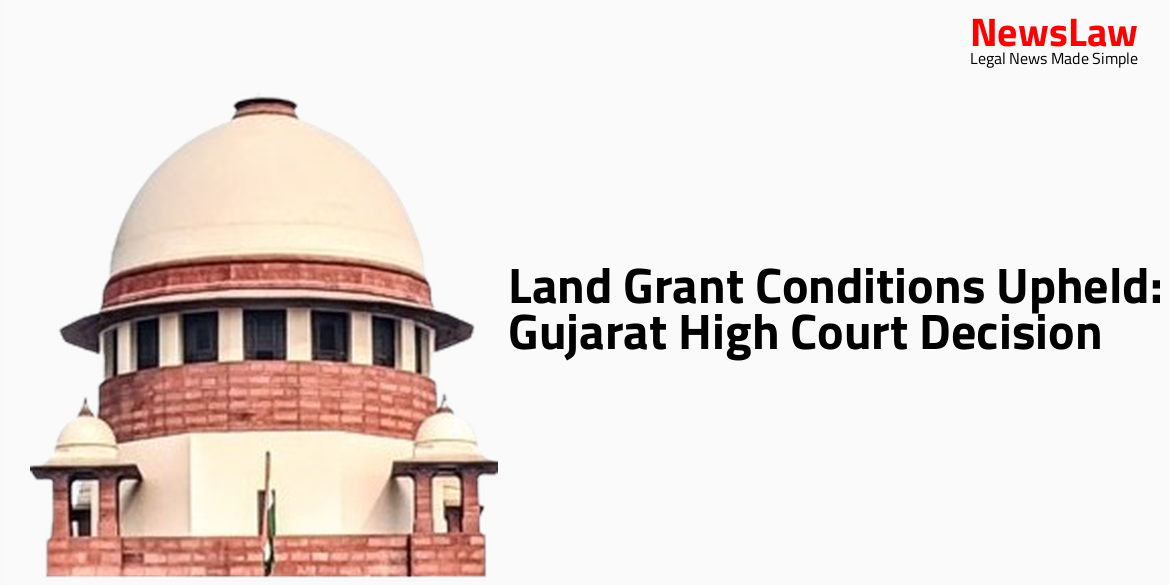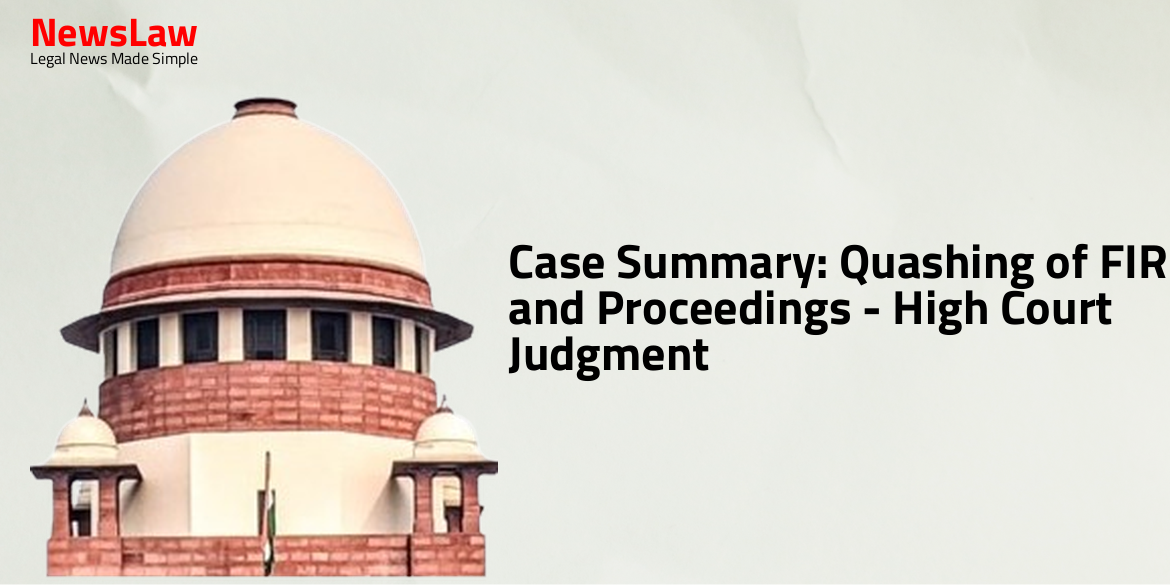In a recent landmark decision by the Gujarat High Court, the court ruled in favor of upholding the conditions of the land grant in a case involving a respondent company seeking N.A. permission. The decision highlights the importance of honoring the original terms of allotment and government resolutions. Find out more about this crucial legal ruling!
Facts
- The Board for Industrial and Financial Reconstruction (BIFR) sanctioned a rehabilitation scheme for the petitioner company on 12.12.1996.
- Clause 8(F)(vii) of the scheme directed the State Government to grant permission for sale/disposal of lands without charging extra amounts.
- The petitioner obtained an alienable right in the land as per the BIFR-sanctioned scheme.
- A subsequent office order modified the condition of the land from ‘unalienable’ to ‘alienable’.
- After court intervention in Special Civil Application No. 3105 of 1998, the State was directed to comply with the BIFR scheme.
- The success of the rehabilitation scheme depended on the State granting permission for land sale and development, as per BIFR’s order.
- Despite a judgment on 8.5.1998, the State has not fulfilled its obligation to allow land sale without additional charges.
- The disputed demand by the State for half of the unearned increment in case of land sale or transfer remains unresolved.
- Writ Petition No. 12585 of 2019 was filed, and subsequently disposed of based on assurances from the Collector, Vadodara.
- Special Civil Application No. 2359 of 2013 led to a remittance for fresh consideration of the matter.
- The Collector’s order on 18.09.2019, rejecting the application for revised non-agricultural use permission, was challenged in the original writ petition.
Arguments
- The State government has no objection to the sale of the land-in-question as long as the condition of sharing half of the unearned income upon sale or transfer is met by the respondent company.
- The State Government is bound to comply with the concession granted before the BIFR and recorded in the scheme about the application of conditions therein.
- The concession made by any party during the formulation of the scheme remains binding even after the BIFR discharges the reference.
- The sanctioned scheme continues to bind the State Government regardless of whether the BIFR implements it or not.
- The BIFR scheme sanctioned in 1996 had expired and cannot be implemented currently.
- The language of the letter dated 16.12.1992 indicated State’s agreement to release land under the Urban Land Ceiling Act, subject to prevalent policy.
- The prevalent policy at the time was outlined in the Government Resolution of 7.8.1956 which specified conditions for grants given to the petitioner.
- The respondent company was to benefit from 50% of unearned income as per the policy of 7.8.1956.
- Violation of the conditions of grant by the respondent company was noted, as they disposed of plant and machinery in 2017.
- The respondent company’s attempt to use the land without adhering to the grant conditions was deemed against public interest.
- Legally, the respondent company was not entitled to convert the land’s purpose without sharing 50% of unearned income with the State.
- The legislative scheme of the Sick Industrial Companies Act, 1985 was discussed to provide context.
- The BIFR scheme and orders relating to land use permissions were contested due to the changed circumstances of the respondent company.
- Potential revocation of the land grant due to lease conditions violation and the respondent company’s profitability in recent years were highlighted.
- The net-worth of the respondent company had turned positive earlier, indicating no requirement to follow the originally sanctioned scheme from 1996.
Analysis
- The rehabilitation scheme framed by the BIFR in 1996 has not been implemented till date.
- The State Government’s insistence on sharing 50% of unearned income is in violation of court orders.
- The concession given by the State Government before the BIFR in 1992 only pertained to releasing the land under the Urban Land Ceiling Act.
- The conditions of the grant, including sharing of unearned income, still bind the parties according to the original lease agreement.
- The company no longer qualifies as a sick industrial company under SICA, 1985, based on its recent profits.
- The BIFR scheme being sanctioned in 1996 has never been enforced, making it academic now.
- The company disposed of its plant and machinery against the conditions of the original grant agreement.
- The Insolvency and Bankruptcy Code, 2016 has replaced SICA, 1985, indicating a change in the legal framework for sick industrial companies.
- The appellate authority’s order in 1998 allowed the company to sell/dispose of the land as per the sanctioned scheme and the State Government’s letter of 1992.
- The BIFR scheme being unused, the NCLT referral under the new Code should be considered.
- Section 18 of the Act is an important provision that makes the sanction accorded by the Board conclusive evidence of compliance with scheme requirements
- Section 17 allows the Board to pass a written order determining if a company is a sick industrial company
- If it’s not feasible for a sick industrial company to recover, the Board can adopt measures specified in Section 18 in the public interest
- A certified copy of the sanctioned scheme by an officer of the Board is admissible as evidence in legal proceedings
- Section 22A empowers the Board to direct a sick industrial company regarding asset disposal during scheme preparation period
- Section 25 provides a remedy of appeal to the appellate authority against the Board’s orders
- Section 32 gives overriding effect to SICA, 1985 provisions, excluding certain laws inconsistent with it
- Sub-sections (9) to (11) of Section 18 show the active involvement of the Board in implementing the sanctioned scheme
- Section 15 allows the Central Government or specified entities to refer a sick industrial company to the Board for measures determination
- Sub-section (5) of Section 18 authorizes the Board to review or modify a sanctioned scheme
- Section 16 outlines the inquiry process by the Board for determining a company’s sick industrial status
- Sub-section (8) of Section 18 specifies the binding nature of the sanctioned scheme on the concerned parties
- Procedures under Section 19 of SICA 1985 must be followed before financial assistance is provided to a sick industrial company
- Section 22 suspends legal proceedings and contracts during certain stages of the process, giving overriding effect to scheme preparation and implementation
- The sanctioned scheme under Section 18 comes into force on a date specified by the Board
- The land in question has been valued at Rs. 1165,86,42,682/- based on its area and market value
- Granting any indulgence to the respondent company would result in enriching their pocket at the expense of public interest
Decision
- The respondent company is seeking N.A. Permission to convert land usage from industrial/commercial to residential without sharing 50% of unearned income with the State.
- State Government concession during BIFR rehabilitation package only allowed land release under Urban Land Ceiling Act, not waiving terms of original allotment.
- The condition of sharing unearned income as per letter of allotment dated 14.11.1960 is binding on the respondent company.
- Judgment of 4.12.2019 by Single Judge ignored these aspects and was based on a previous judgment of 8.5.1998.
- Single Judge’s decision is set aside in this Letters Patent Appeal, but respondent company must comply with original terms of allotment and Government Resolution.
Case Title: STATE OF GUJARAT Vs. TENSILE STEEL LTD.
Case Number: R/LPA/225/2020



